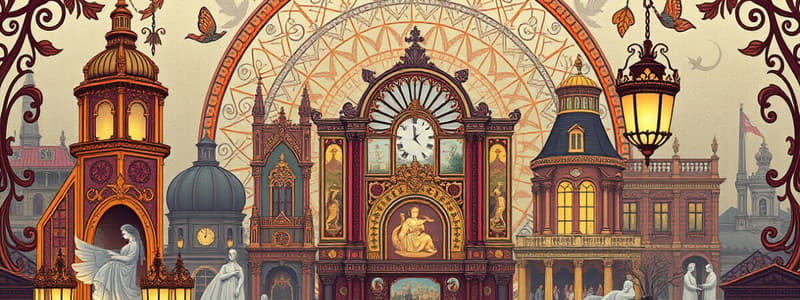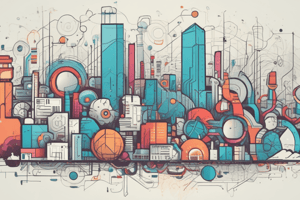Podcast
Questions and Answers
What characterizes a business cycle?
What characterizes a business cycle?
- Periods of growth followed by periods of decline (correct)
- Stagnation in economic activity over time
- Consistent upward growth in economic activity
- A linear growth pattern without recessions
Which of the following defines capitalism?
Which of the following defines capitalism?
- Individuals own and operate the majority of businesses (correct)
- A method of production based on community cooperation
- A system where the government controls all businesses
- An economic system dominated by collective ownership
What is deflation?
What is deflation?
- A general decrease in the level of prices (correct)
- A type of economic growth
- An increase in the supply of money
- An increase in consumer spending
Which of the following best describes a monopoly?
Which of the following best describes a monopoly?
What does GDP represent?
What does GDP represent?
In microeconomics, which aspect is primarily studied?
In microeconomics, which aspect is primarily studied?
What is inflation?
What is inflation?
Which term describes a market situation with many buyers and sellers, where no single entity can control the market price?
Which term describes a market situation with many buyers and sellers, where no single entity can control the market price?
The Consumer Price Index (CPI) measures changes in what?
The Consumer Price Index (CPI) measures changes in what?
What distinguishes a mixed economy?
What distinguishes a mixed economy?
What does the term 'invisible hand' refer to in economics?
What does the term 'invisible hand' refer to in economics?
What does fiscal policy involve?
What does fiscal policy involve?
What is a primary goal of monetary policy?
What is a primary goal of monetary policy?
What is the definition of a command economy?
What is the definition of a command economy?
Flashcards are hidden until you start studying
Study Notes
Economic Concepts
- Business cycle: Alternating periods of economic growth and recession affecting national economic activity.
- Business: Organized efforts to produce and sell goods/services for profit, fulfilling societal needs.
- Capitalism: Economic system characterized by private ownership and operation of businesses.
- Command economy: Government determines the production, processes, distribution, and ownership of goods and services.
Market Systems and Economics
- Competition: Rivalry among firms to attract customers and increase sales.
- Consumer Price Index (CPI): Monthly measure tracking price changes of a standard basket of goods for urban consumers.
- E-business: Commercial transactions conducted online, leveraging internet facilities for profit.
Economic Conditions
- Deflation: Reduction in overall price levels in an economy.
- Depression: Extended period of severe recession, marked by significant declines in economic activity.
- Inflation: General increase in prices across the economy.
Economic Metrics
- Gross Domestic Product (GDP): Total monetary value of all goods and services produced within a country's borders in a specific time frame.
- Producer Price Index (PPI): Monthly index assessing prices that producers receive for their final goods.
Business Structures and Practices
- Domestic system: Manufacturing approach where raw materials are provided to households for processing into finished goods.
- Factory system: Centralized production system gathering materials, machinery, and labor in one location.
Economic Policies
- Fiscal policy: Governmental adjustments in taxation and spending influencing savings and expenditure levels.
- Monetary policies: Federal Reserve strategies aimed at stabilizing the economy, affecting employment and interest rates.
Market Dynamics
- Market economy: System driven by individual decisions regarding production and consumption, shaped by market forces.
- Market price: Equilibrium price where the quantity of goods demanded matches the quantity supplied.
- Product differentiation: Strategy of distinguishing a company's products from competitors to gain market share.
Types of Competition
- Monopoly: Market situation with a single seller controlling supply, limiting consumer choice.
- Oligopoly: Market characterized by a few dominant sellers influencing prices.
- Monopolistic competition: Market structure with many sellers offering differentiated products.
Economic Contributions
- Productivity: Measured output per worker per hour, indicating efficiency levels.
- Profit: Revenue remaining after expenses are deducted, essential for business sustainability.
Employment and Economic Structure
- Service economy: Economic framework focusing more on services offered rather than goods produced.
- Cultural diversity: Emphasizes respect for differences in demographics such as age, gender, ethnicity, and ability.
Economic Challenges
- Recession: Characterized by two consecutive quarters of declining GDP, indicating economic slowdown.
- Federal deficit: Occurs when government expenditures exceed revenues within a fiscal year.
- National debt: Cumulative total of federal deficits, reflecting the government's borrowing history.
Studying That Suits You
Use AI to generate personalized quizzes and flashcards to suit your learning preferences.





